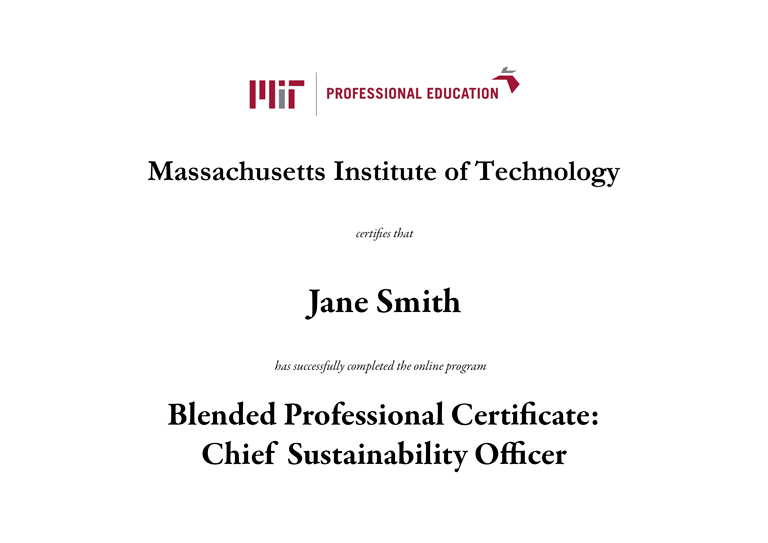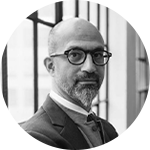DURATION
Why is a CSO integral to the quality of your organization?
The role and importance of Chief Sustainability Officer (CSO) may be relatively new, but it is rapidly becoming more and more essential in organizations, as concerns about sustainability and effects of climate change increasingly dominate the global agenda. Organizations must do their part to assist in this international responsibility.
A CSO drives the sustainability strategy of an organization, serves as the primary advocate, and monitors its efforts. This integral position is now a fixture in the C-suite.
The inherent benefits of putting sustainability at the center of a corporate strategy are diverse both for the success of the organization and in ethical terms. The benefits reaped from a CSO include increasing profits, improving the company’s reputation, making the organization more likely to attract and retain talent, increasing customer relations, and creating a culture of positive sustainable change within the company.
228%
Demand for CSOs has grown by roughly 228% over the last decade.
Source: Weinreb Group
20%
Executive who received leadership training improved their performance by 20%.
Source: Research Gate 2021
54%
In 2021, the percentage of women in CSO roles has almost doubled, now accounting for more than half (54%) of CSO positions.
Source: Business Chief
Blended Professional Certificate: Chief Sustainability Officer
The full scope of ‘sustainability’ covers a wide range of topics from our global and regional environments, green industries, and infrastructure to complex geopolitical dynamics. All are inextricably interconnected. Understanding the limitations and the progress of our systems at every step is a critical step in understanding how we can begin to envision a better way forward.
Realizing our current state of sustainability is essential to accelerating it. From here we must highlight how to evolve, enhance, and implement our systems in the present for the future.
MIT Professional Education’s Blended Professional Certificate in Chief Sustainability Officer is aimed at professionals with seniority in their organizations who want to better execute sustainable practices as Chief Sustainability Officers.
The Learning Journey
In this 12-month program, participants will explore these five courses that will equip you with the tools and frameworks to lead the Sustainability strategy.
1. Leadership and Innovation
With this program, participants will learn to lead by coming to know themselves better, harnessing their own creativity, and building teams and organizations through the culture of innovation.
2. Sustainability: Strategy and Opportunities for Industry
The time to act is upon us, and increased focus on sustainability provides businesses with significant benefits, from reductions in waste and costs to additional opportunities for investment as consumer behavior evolves.
3. Life Cycle Assessment: Quantifying Environmental Impacts
This course will provide a foundation for conducting and interpreting LCAs, following the approach defined in international standards. The steps include goal and scope definition, life cycle inventory, life cycle impact assessment, and interpretation.
4. Sustainable Infrastructure: Planning and Operations
You will explore systems theory as the basis for analysis, development, and engineering of sustainable, adaptable technological systems. This course will equip you with the knowledge and skills needed to develop modern sustainable infrastructure, from public policy and planning to operations management and data collection.
5. Circular Economy: Transition for Future Sustainability
This course provides a fundamental understanding of the meaning and evolution of a circular economy and the roles of material science, economic and institutional. Explore innovation and evolution with a focus on circular economies at the corporate level, through specific examples like water, metals and waste recycling, and others.
6. Impact project
The Impact Project is a transversal project that will be carried out throughout the Blended Professional Certificate. Participants will work in teams on a series of assignments that will culminate in a final presentation on the MIT Campus.
Participants will be given a choice of two tracks for this project:
1. Work on a project with an industry challenge provided by the learning facilitator.
2. Work on a project (industry challenge) chosen by the group and approved by the learning facilitator.
Learning Objectives
1. Develop individual reflections on the theoretical and practical concepts covered throughout the certificate courses
2. Apply knowledge acquired in courses to real-life industry cases
3. Integrate and connect ideas from each course, resulting in transversal knowledge acquisition
4. Build a community of practice in small groups, proposing concrete solutions to complex industry problems
Premium Access to the MIT Professional Education Ecosystem
You will have exclusive access to networking events, live online sessions with guest speakers, company visits, and the international MIT Alumni network.
Career Development
You will participate in sessions with a career advancement coach who will guide you toward your goals and prepare you for new and exciting challenges.
Digital Pathway Access
You will have access to a gallery of webinars in multiple languages on a wide variety of relevant topics. Additionally, you will be invited to attend upcoming live webinars.
Application Process
To be considered as an eligible candidate, please proceed with the following steps:
Application
Round 1
Fee: .
Round 2
Fee: .
Round 3
Fee: .
What is included in the fee?
- The program fee includes teaching fees, access to online coursework, and transportation to the different activities taking place during the face-to-face events.
- The program fee does not include accommodations for the in-campus weeks, travel expenses (domestic, international, visa fee, and more), and other expenses not specifically mentioned in the fees.
Key Takeaways
Throughout this professional program, you will:
1.
Understand what is sustainability, its root causes and how to measure it through different techniques.
2.
Formulate cogent and rigorous positions and arguments in order to make sustainability decisions within your organization.
3.
Being able to elaborate pragmatic strategies that can be employed across different sectors to bolster sustainability.
4.
Learn how to implement life-cycle sustainability assessments (LCSAs) to identify and develop new methods for boosting sustainability.
5.
Understand the meaning and evolution of a circular economy and the roles of material science, economic and institutional structures, and technology.
6.
Acquire the required leadership skills to drive and implement the sustainability agenda in your company.
In addition, you will receive a Certificate of Completion
All the participants who successfully complete Chief Sustainability Officer will recieve a Certificate of Completion from MIT Professional Education. Furthermore, the participants who complete the program recieve Continuing Education Units (CEUs)*.
To obtain CEUs, complete the accreditation confirmation, which is available at the end of the course. CEUs are calculated for each course based on the number of learning hours.
* The Continuing Education Unit (CEU) is defined as 10 contact hours of ongoing learning to indicate the amount of time they have devoted to a non-credit/non-degree professional development program.
To understand whether or not these CEUs may be applied toward professional certification, licensing requirements, or other required training or continuing education hours, please consult your training department or licensing authority directly.

This Blended Professional Certificate:Chief Sustainability Officer is designed for
- Directors and VP responsible to setting and running the Sustainability agenda and strategy in their companies.
- Current and aspiring C-suite executives responsible for strategy.
- Senior consultants and entrepreneurs focused on sustainability.
- Policy makers and development markers that need a deep understanding about Sustainability and how to manage it.
Participants are required to have:
- A minimum of ten years of experience working in a managerial position
- At least 3 years of experience managing projects related to technology, innovation, or business development
- International experience is appreciated
Meet the instructors of this program
Listed in alphabetical order

His work in sustainability began with research regarding materials for high performance buildings, low energy residence, and urbanization.

Gregory’s research topics include product and firm environmental foot-printing, manufacturing and life-cycle cost analysis, and characterization of sustainable material systems. He has applied these methods, often with industry partners, to a range of products and industries, including cement, buildings, automobiles, electronics, consumer goods, and waste treatment and recovery. He earned a BS in mechanical engineering from Montana State University, and an MS and PhD in mechanical engineering from MIT.

David consults with technology executives on topics related to developing leadership among engineers, researchers, and other technical experts. He has published on organizational culture, ethics, engineering leadership, and developing management and leadership skills. David holds a Ph.D. in Management from the University of Texas at Austin, where he earned his B.A., B.B.A., and M.A. degrees. He lives in Weston, Massachusetts, with his wife and three children.

Olivetti’s interests span three levels of materials production: operational-level, industrial network-level and market-level strategies. She is focused on two areas with the potential for significant environmental benefits: improving the sustainability of materials through increased use of recycled and renewable materials, recycling-friendly material design, and intelligent waste disposition; and understanding the implications of substitution, dematerialization, and waste mining on materials markets.
Olivetti earned a BS in engineering science from the University of Virginia, and a Ph.D. in materials science and engineering from MIT.


Since 2001, de Weck’s group has developed original quantitative methods and tools that explicitly consider manufacturability, flexibility, commonality, and sustainability, among other characteristics. De Weck’s teaching emphasizes excellence, innovation, and the irrefutable bridge between theory and practice.